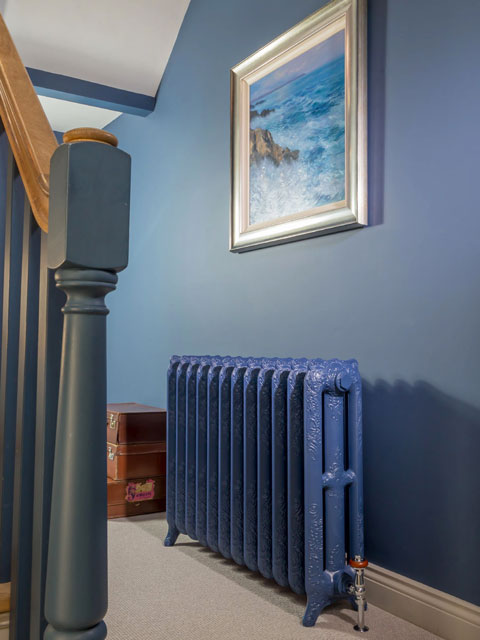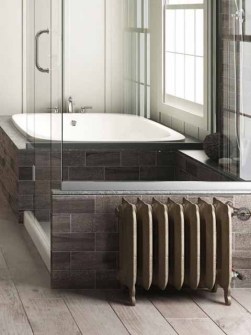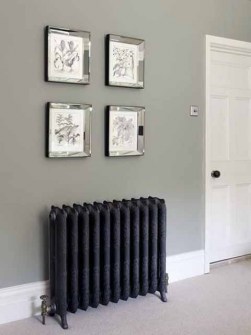BENEFITS OF THIS RADIATOR
Benefits of this cast iron radiator:
- stylish vintage radiator
- good heat outputs
- available from 4 to 15-25 sections
- available in 10 unique and 200 RAL Classic colours
- central heating radiator
- available accessories: manual valves, thermostatic valves
- also available in an electric version (see the Avignon Electric radiator)
Please note that the cast iron radiators are manufactured from crude iron according to a nearly 100-year-old technology , by using original moulds.
Their surface might be uneven and coarse; the joints do not always fit precisely. Although such differences may not seem like very refined workmanship, these features add to the authentic and antique appearance of these radiators.
Cast iron radiators are heavy and hard to move. This needs to be taken into consideration as delivery can be carried out exclusively up to a street gate or entrance accessible by lorry.
MATERIAL(S) of this radiator: cast iron
WARRANTY: 5 years
DELIVERY SCHEDULE: approx.5 weeks
TECHNICAL SPECIFICATIONS
Sizes of this cast iron radiator:
Height (with legs): 470mm high
Widths (vent valve: plus 15mm!): 359mm wide, 440mm wide, 521mm wide, 602mm wide, 684mm wide, 765mm wide, 846mm wide, 927mm wide, 1008mm wide, 1090mm wide, 1171mm wide, 1252mm wide, 1333mm wide, 1414mm wide, 1496mm wide, 1577mm wide, 1658mm wide, 1739mm wide, 1820mm wide, 1902mm wide, 1983mm wide, 2064mm
Height (with legs): 570mm high
Widths (vent valve: plus 15mm!): 357mm wide, 438mm wide, 518mm wide, 599mm wide, 680mm wide, 760mm wide, 841mm wide, 922mm wide, 1002mm wide, 1083mm wide, 1164mm wide, 1245mm wide, 1325mm wide, 1406mm wide, 1487mm wide, 1567mm wide, 1648mm wide
Height (with legs): 765mm high
Widths (vent valve: plus 15mm!): 359mm wide, 440mm wide, 521mm wide, 602mm wide, 684mm wide, 765mm wide, 846mm wide, 927mm wide, 1008mm wide, 1090mm wide, 1171mm wide, 1252mm wide
Technical specifications:
Heat outputs: All heat outputs are shown at operating temperatures of 75/65/20 (Δt50°C). All radiators have been manufactured and tested in accordance with DIN EN 442.
Valves: These cast iron radiators are not supplied with valves.
Available connections:
A) 4 x 1/2" BSP side connections - Centre-to-centre distance of connections: 300mm (470mm high model), 400mm (570mm high model), 600mm (765mm high model)
B) 2 x 1/2" BSP bottom opposite ends (BOE) connections - Centre-to-centre distance of connections: nominal width + valves
Distance between the floor and the bottom connection: 115mm
Maximum operating pressure: 2,5 bar
Maximum water temperature: 95°C
Air Vent: All radiators are supplied with air vent valves.
Finish: High quality, environmentally friendly, double electrostatic powder coating according to DIN 55900.
See the technical drawing(s) HERE and HERE
COLOURS
Please note the displayed colour will depend on your monitor and browser, so colours cannot be shown perfectly. For this reason you may find differences between hue and shade on your screen and the radiator manufactured for you.
See the available colours HERE and HERE (in JPG format) / HERE and HERE (in PDF format)
SAFETY NOTICE
SAFETY NOTICE
In order to avoid accidents keep to the following safety regulations:
INSTALLATION AND MAINTENANCE OF RADIATORS
• All radiators must be installed and maintained by a certified professional, who provides legal guarantee for the work done.
• The radiators must be installed exclusively by certified fittings provided by the manufacturer.
• The radiator must be fixed soundly to the wall; as radiators are very heavy, torn out of the wall they can do extensive damage and seriously injure people nearby.
• Radiators can be fixed to walls that can carry their weight. Too thin and drywall walls must be reinforced by a professional before installation.
• Use the radiators strictly according to their purpose.
• Radiator holders are designed to safely carry the weight of the radiator; for this reason never put any extra weight on it, cling to it or lean, sit or stand on it even for a second.
• The radiator should not be placed behind or below furniture or other obstacle for the circulation of air.
• The radiator can be damaged by mechanical force caused by hard objects, so avoid this by all means.
• If you notice any damage, fracture, etc. on the radiator, switch it off immediately or turn off the heating. In the case of electric and dual fuel radiators disconnect the device from electricity.
HOT WATER RADIATORS
• Faulty or damaged radiators can leak hot water, which might cause serious burn injuries. In case you cannot wait until it cools down touch the hot radiator with utmost care.
ELECTRIC AND DUAL FUEL RADIATORS
• Electric and dual fuel radiators must be handled with the same level of caution and safety measures as any other electrical household appliances.
• Keep the electrical cord intact. Cords must not get in contact with the hot radiator.
• Electric/dual fuel radiators in rooms with running water can be installed only in areas determined by the IP Code provided with each electric/dual fuel radiator. The IP zones drawing can also be found with these models. (The IP Code, International Protection Marking, IEC standard 60529, sometimes interpreted as Ingress Protection Marking, classifies and rates the degree of protection provided against intrusion (body parts such as hands and fingers), dust, accidental contact, and water by mechanical casings and electrical enclosures.)
GLASS AND MIRROR RADIATORS
• Although tempered glass, used for glass and mirror radiators, is many times stronger than float glass and complies with the EU standards, it is apparently not unbreakable, consequently it needs caution (despite the fact that, when broken, it usually will break into small fragments, which are less likely to cause serious injury.).
• Do not let any mechanical force caused by hard and sharp objects damage the surface of the glass/mirror.
CHILD SAFETY
• Unless the heating temperature is set low make sure that children are supervised near the radiator. As the body surface of a child is bigger than that of an adult, and their skin is considerably thinner, a hot radiator or hot water leaking from a damaged radiator can do more serious burn injuries to them.
• Some radiator models have sharp edges, which can also cause injuries to children. For this reason, if you live with children, or have children around unsupervised, install only radiators with rounded edges.
• Keep children away from the cord of the electric/dual fuel radiator. The best solution is wires hidden in the wall or the use of cord cover.




